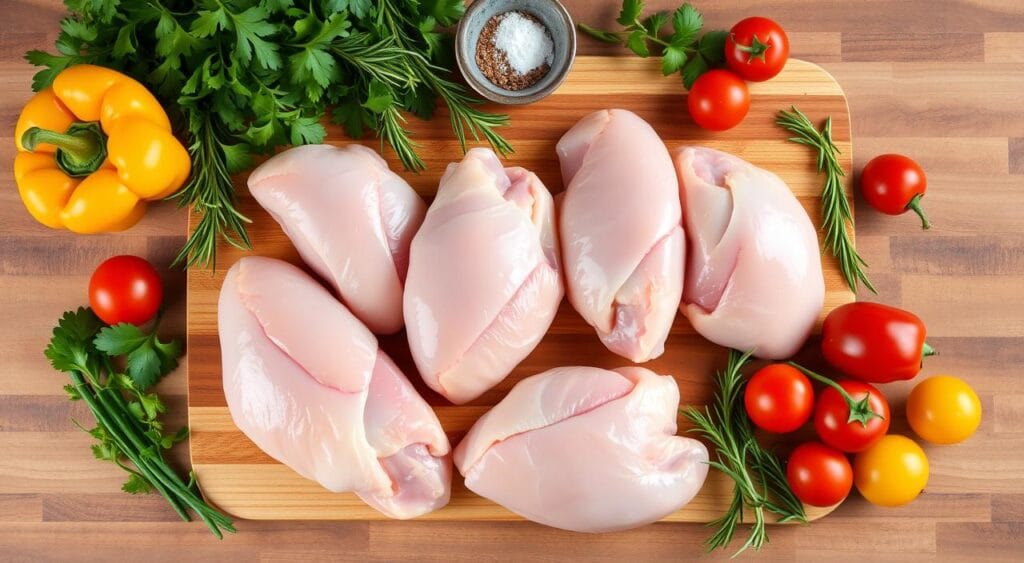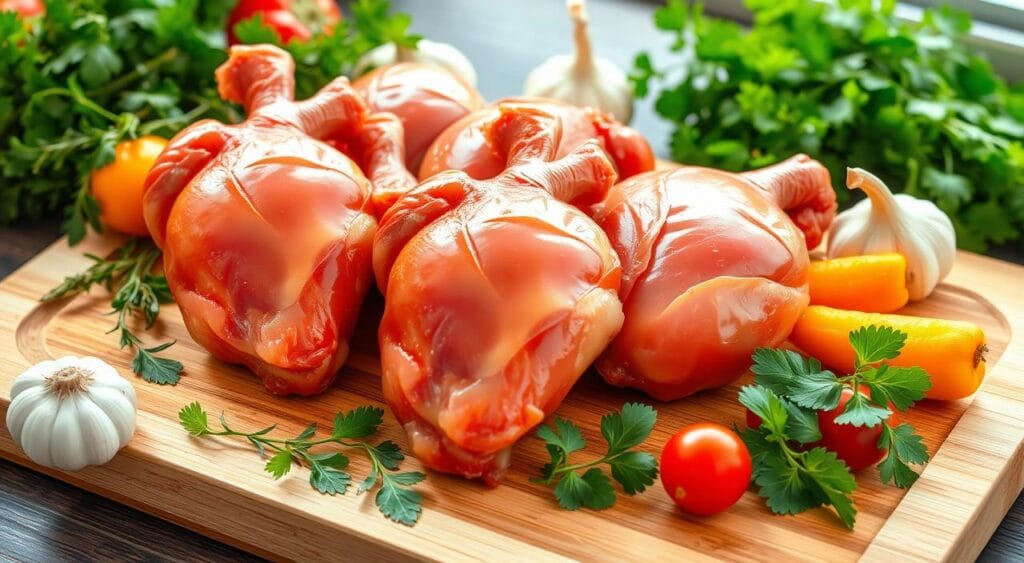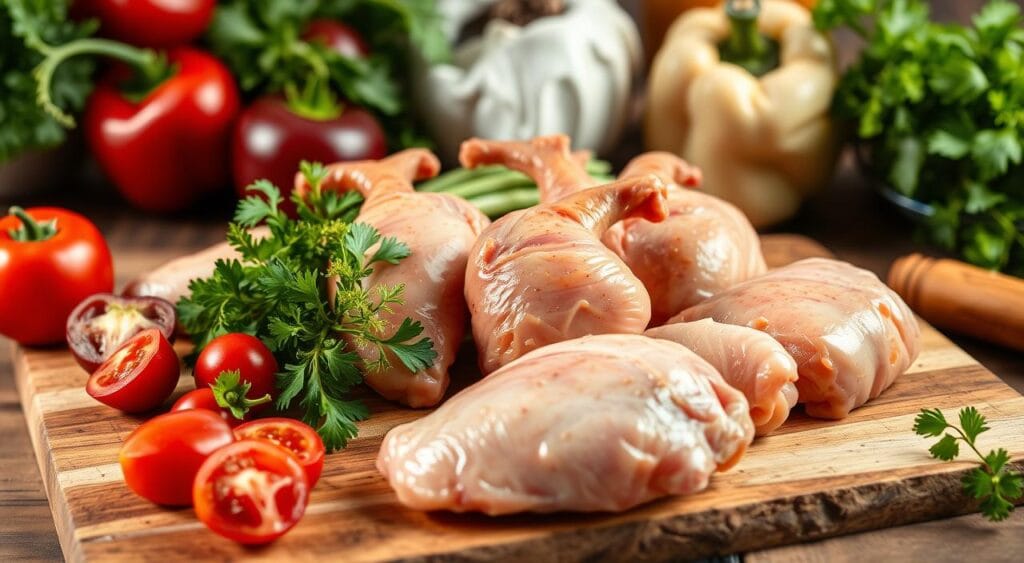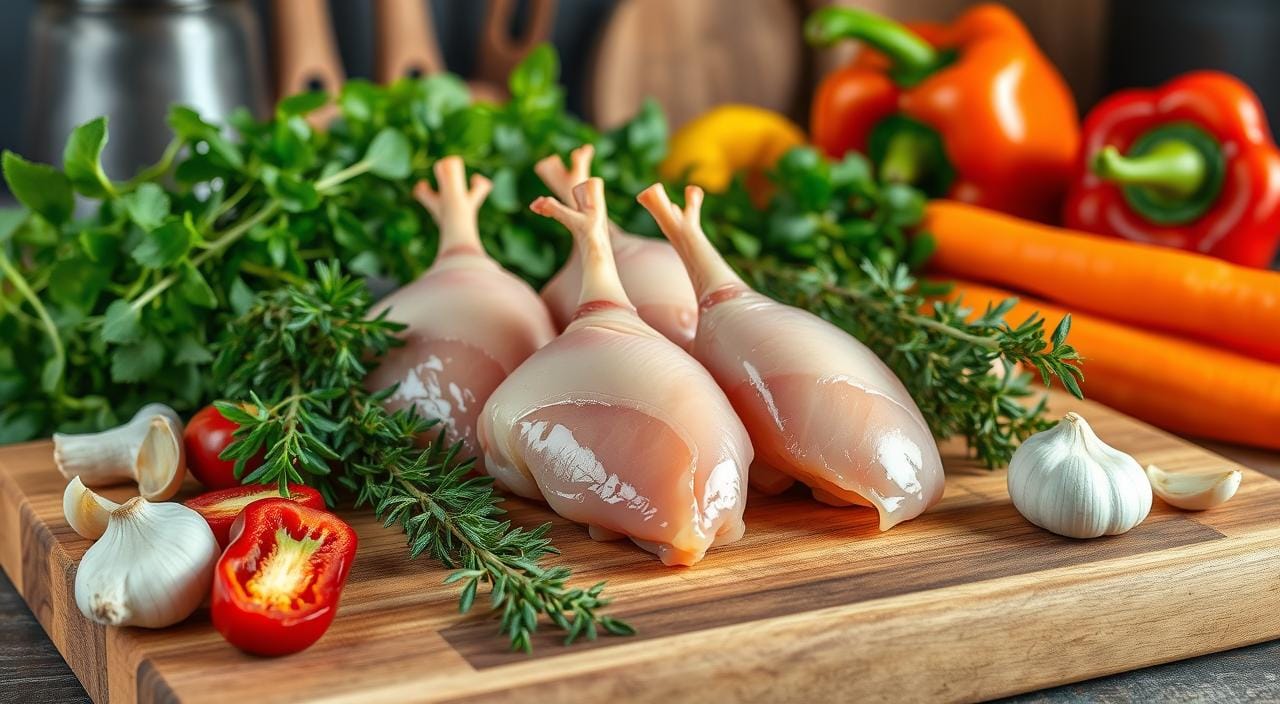Table of Contents
Have you thought about adding chicken hearts to your diet? They are packed with protein, iron, and B vitamins. This makes them a great choice for those who care about their health. You can grill, sauté, or stew chicken hearts, adding variety to your meals.
Chicken hearts offer many health benefits. They are low in fat and cholesterol, which is good for your heart. They also have lots of vitamin B12, iron, and zinc. This makes them perfect for boosting your nutrition. Plus, they fit well into low-carb and keto diets.
Key Takeaways
- Chicken hearts are a nutrient-dense organ meat rich in protein, iron, and B vitamins.
- They are low in fat and cholesterol, making them a heart-healthy choice.
- Chicken hearts are versatile in cooking and can be grilled, sautéed, or stewed.
- They are suitable for low-carb and keto diets due to their high protein and low carbohydrate content.
- Chicken hearts are rich in essential nutrients like vitamin B12, iron, and zinc.
- They can be easily found in local butcher shops and specialty markets.
- Chicken hearts are a cost-effective option compared to popular cuts of chicken.
What Are Chicken Hearts and Their Nutritional Profile
Chicken hearts are packed with nutrients like protein, vitamins, and minerals. They have few calories and fat, which is good for weight management. They offer vitamins and minerals like vitamin B12, iron, and zinc. These are key for healthy red blood cells, nerve function, and the immune system.
A one-cup (145g) serving of cooked chicken hearts has 268 calories. It also has 38.3g of protein and 11.5g of fat. Chicken hearts are high in protein, which helps keep muscles strong. They are a great addition to a balanced diet.

Essential Nutrients in Chicken Hearts
Chicken hearts are full of important nutrients, including:
- Vitamin B12: 440% of the daily value per one-cup serving
- Iron: 164% of the daily value per one-cup serving
- Zinc: 96% of the daily value per one-cup serving
- Potassium: 41% of the daily value per one-cup serving
Chicken hearts are a great choice for boosting essential nutrients. They have a high protein-to-calorie ratio and are rich in minerals. Adding chicken hearts to your diet can be very beneficial.
The Amazing Health Benefits of Chicken Hearts
Chicken hearts are packed with nutrients, making them a great choice for a healthy diet. They have about 26 grams of protein per serving. This makes them perfect for those who want to eat more protein. Plus, they are low in fat and calories, with only 0.7 grams of net carbs per serving.
Chicken hearts help build muscle and improve endurance, which is key for fitness and bodybuilding. They are also full of essential B vitamins like B12, B2, B5, B6, and B3. These vitamins boost your vitamin intake. Chicken hearts are also a good source of iron in a form that your body can easily absorb. This supports healthy red blood cells and a strong immune system.

- Supporting heart health due to their richness in coenzyme Q10 (CoQ10), low saturated fats, and taurine
- Aiding in weight management by increasing feelings of fullness due to their high protein content
- Providing essential minerals such as zinc and selenium, supporting various bodily functions including immune system and metabolism regulation
Eating chicken hearts regularly can boost your immune system. This supports your overall health and wellness. They are also a good source of vitamin B6, which helps protect your heart. With their high levels of choline and iron, chicken hearts improve brain function and cognitive performance. They are a fantastic addition to a healthy diet.
Understanding the Role of Chicken Hearts in Muscle Development
Chicken hearts are packed with nutrients and play a big role in building muscles. They have about 26 grams of protein per serving. This makes them a top choice for those looking to grow and repair muscles.
For athletes and anyone who’s active, chicken hearts are perfect. They’re full of essential amino acids, which are key for muscle growth. The protein in chicken hearts helps muscles get stronger and heal faster.
Some of the key benefits of chicken hearts for muscle development include:
- High protein content to support muscle growth and repair
- Rich in essential amino acids for muscle development
- Low in calories, making them an ideal food for those watching their weight

Chicken hearts are not just good for muscles. They’re also tasty and add important nutrients to your diet. They help with muscle development and overall health.
How to Select and Store Fresh Chicken Hearts
When picking fresh chicken hearts, look for ones that are plump and firm. They should have a shiny, deep red color. You can find them in butcher shops, Asian markets, or specialty stores. Choose hearts that are fresh and of high quality.
To keep chicken hearts fresh, store them in the fridge at 40°F (4°C) or below. Use them within a day or two. This prevents spoilage. Always handle them safely to avoid contamination and illness.
Here are some tips for selecting and storing fresh chicken hearts:
- Check the packaging for any signs of damage or leakage
- Look for chicken hearts that are plump and firm to the touch
- Avoid chicken hearts with any visible signs of spoilage, such as sliminess or off odors
- Store chicken hearts in a covered container in the refrigerator to prevent moisture and other contaminants from affecting them
By following these tips, you can enjoy fresh and healthy chicken hearts. Always prioritize food safety and handle chicken hearts with care. Learning how to store and select chicken hearts is key for a great culinary experience.
| Storage Method | Temperature | Shelf Life |
|---|---|---|
| Refrigeration | 40°F (4°C) or below | 1-2 days |
| Freezing | 0°F (-18°C) or below | 8-12 months |
Properly Cleaning and Preparing Chicken Hearts
To keep chicken hearts safe and tasty, it’s key to know how to clean and prepare them. First, rinse them well under cold water. Then, cut off any fat or connective tissue. This step is vital for food safety, as it lowers the risk of getting sick from food.
When preparing chicken hearts, remember a few important things. Make sure to cook them to 165°F, as the USDA advises. You can do this by cooking them over medium-high heat for 5-7 minutes. Also, handle and store them safely to avoid contamination.
Step-by-Step Cleaning Guide
Don’t make the mistake of not cooking chicken hearts to a safe temperature. To clean and prepare them right, follow these steps:
- Rinse the chicken hearts under cold running water
- Trim off any visible fat or connective tissue
- Pat dry with paper towels to remove excess moisture
Food Safety Considerations
Always put food safety first when working with chicken hearts. Store them in a sealed container in the fridge at 40°F or below. Eat them within a few days of buying. Adhering to these guidelines ensures a delightful and secure dining experience.
Delicious Ways to Cook Chicken Hearts
There are many ways to cook chicken hearts. You can grill or sauté them for a crispy outside and soft inside. Or, stew or braise them for a hearty dish.
For something new, try chicken hearts in stir-fries or curries. Experiment with different cooking methods and spices. Some tasty ideas include chicken heart skewers, tacos, and stir-fries.
Grilling and Skewering Methods
Grilling and skewering add a smoky taste to chicken hearts. Thread the hearts onto skewers, brush with oil, and season. Grill over medium-high heat for 5-7 minutes per side, until they’re 165°F inside.
Stewing and Braising Techniques
Stewing and braising make chicken hearts tender and flavorful. Brown the hearts in a pan, then add your favorite liquids and spices. Simmer for 20-30 minutes, until the hearts are tender and the sauce thickens.
International Cooking Styles
Chicken hearts can be cooked in many international styles. Try Asian stir-fries or Latin American tacos. Experiment with different cooking methods and spices. Some favorites include stir-fries, tacos, and curries.
| Recipe | Cooking Method | Ingredients |
|---|---|---|
| Chicken Heart Skewers | Grilling | Chicken hearts, oil, spices |
| Chicken Heart Stir-Fry | Stir-frying | Chicken hearts, vegetables, soy sauce |
| Chicken Heart Tacos | Grilling | Chicken hearts, tortillas, salsa |
Incorporating Chicken Hearts into Your Weekly Meal Plan
Creating a chicken hearts meal plan is easy. You can add them to salads, soups, and stir-fries. Or, use them as a main protein source. Try adding chicken hearts to your favorite recipes for a nutritious and tasty meal.
Here are some culinary ideas to initiate your meal planning:
- Grilled chicken hearts with roasted vegetables
- Chicken heart soup with quinoa and kale
- Stir-fry with chicken hearts, brown rice, and mixed vegetables
For a more detailed meal plan, consider the following table:
| Meal | Calories | Protein | Fat | Carbohydrates |
|---|---|---|---|---|
| Grilled chicken hearts with roasted vegetables | 350 | 30g | 10g | 20g |
| Chicken heart soup with quinoa and kale | 400 | 25g | 15g | 30g |
| Stir-fry with chicken hearts, brown rice, and mixed vegetables | 500 | 35g | 20g | 40g |
Remember to mix up your meal ideas and recipes for a balanced diet. With a bit of creativity, you can make a delicious and healthy chicken hearts meal plan that fits your taste and dietary needs.
Safe Feeding of Chicken Hearts to Pets
Feeding chicken hearts to pets, especially dogs, needs careful attention. Chicken hearts can be a nutritious treat but should be given in small amounts. A balanced diet is key to your pet’s health.
Start by adding chicken hearts slowly to your dog’s diet to avoid stomach issues. A medium-sized dog can have one chicken heart a day. Always check with your vet to find the right amount for your pet.
Other foods like canned pumpkin, salmon, eggs, and broccoli can also boost your dog’s health. These foods add fiber, protein, and minerals. A balanced diet keeps your pet happy and healthy.
Feeding chicken hearts to dogs has many benefits. They are packed with protein and nutrients. They also have omega fatty acids and coenzyme Q10. These help the heart and gums stay healthy and prevent diseases like DCM.
- Rich in protein and essential nutrients
- High levels of omega fatty acids and coenzyme Q10
- Supports heart and gum health
- Aids in preventing conditions such as Dilated Cardiomyopathy (DCM)
Potential Considerations and Contraindications
It’s important to know the potential risks of eating chicken hearts. They have a lot of cholesterol and purines. These can be bad for people with high cholesterol or gout. Health considerations are key, especially for those with health issues.
Recent studies show that lean chicken, like chicken hearts, might not be bad for your heart. But, chicken hearts contraindications might apply to some people. Always talk to a doctor before changing your diet.
The American Heart Association suggests eating less than 6 ounces of lean meat a day. Potential risks of chicken hearts include high cholesterol and fat. To avoid these, grill or broil them to keep them moist.
The table below highlights important points for eating chicken hearts:
| Health Condition | Considerations |
|---|---|
| High Cholesterol | Limit cholesterol intake, cook using low-fat methods |
| Gout | Limit purine intake, stay hydrated |
| Cardiovascular Risk | Choose lean, unprocessed chicken, limit saturated fat intake |
In summary, chicken hearts can be good for you but with some caution. Be aware of health considerations and chicken hearts contraindications. This way, you can enjoy chicken hearts safely and healthily.
Conclusion: Making the Most of This Nutrient-Dense Organ Meat
Chicken hearts are a hidden gem in the world of food. They are full of vitamins, minerals, and healthy fats. These organ meats are great for muscle growth, boosting energy, and adding flavor to meals.
This guide has shown you how to use chicken hearts to their fullest. You can learn how to pick and cook them. This will help you improve your cooking and enjoy the health benefits.
Don’t be shy to try new things with chicken hearts. They have unique tastes and textures. With a bit of creativity, they can become a favorite in your kitchen.
FAQ
What are the key nutrients in chicken hearts?
What are the health benefits of eating chicken hearts?
How can chicken hearts support muscle development?
How should you select and store fresh chicken hearts?
How do you properly clean and prepare chicken hearts?
What are some delicious ways to cook chicken hearts?
Can you feed chicken hearts to pets?
Are there any potential contraindications or considerations for eating chicken hearts?
Source Links
- Chicken Heart Nutrition: Is Chicken Heart Healthy? – https://discover.grasslandbeef.com/blog/chicken-heart-nutrition/
- Chicken Heart: A Comprehensive Guide to Nutrition, Benefits, and Culinary Uses – https://meatdishe.com/chicken-heart-a-comprehensive-guide-to-nutrition/
- Delicious Chicken Hearts: A Nutritious Protein-Rich Food – https://www.tessasrecipes.com/delicious-chicken-hearts-a-nutritious-protein-rich-food/
- Chicken Hearts – https://www.bjsrawpetfood.com/products/chicken-hearts-1?srsltid=AfmBOoo7l0RHPzpldPGquWAtu0Pse7dkJqDlIJN72iq5qtly9tPtE9M4
- New To Organ Meat? Here’s 10 Health Benefits Of Chicken Hearts – https://sensationalseasonals.com/blogs/wellness/new-to-organ-meat-heres-10-health-benefits-of-chicken-hearts
- Chicken Heart Nutrition: Unlock Its Surprising Health Benefits – https://jimajackson.com/chicken-heart-nutrition
- Grass-Fed Organ Meat to Great Danes – https://paworigins.com/blogs/vet-blogs/grass-fed-organ-meats-to-great-danes
- Chicken Heart Recipe – Country Recipe Book – https://countryrecipebook.com/chicken-heart-recipe/
- The molecular mechanisms of cardiac development and related diseases – Signal Transduction and Targeted Therapy – https://www.nature.com/articles/s41392-024-02069-8
- Healthy Grilled Chicken Hearts Recipe – https://sevensons.net/recipes/chicken-hearts-recipe?srsltid=AfmBOorEozwtClNkv0BIJgo3auHiQM7NjK7hkkPk2yLuh7fMQFeNI73i

